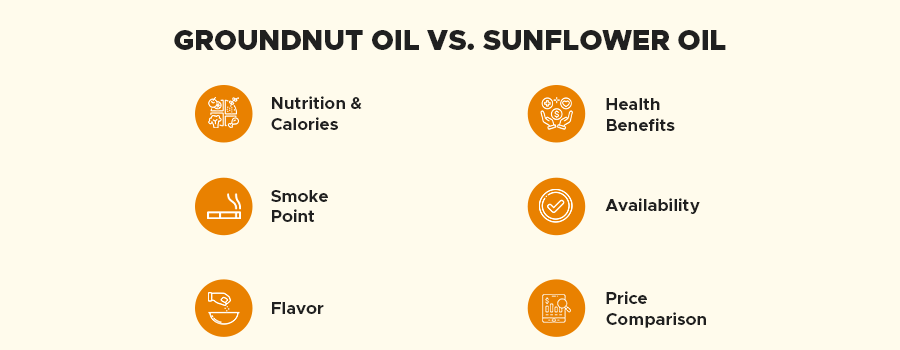
Cooking oils are an essential part of our daily meals. But with so many options like groundnut, sunflower, olive, rice bran, mustard, and more - how do you choose a healthy cooking oil for your needs? Groundnut and sunflower oils are two of the most popular options. But they have some key differences when it comes to nutrition, taste, smoking point, and more. Read on as we do a head-to-head comparison of groundnut vs sunflower oil which is better.

Nutrition & Calories
First, let's examine the nutritional profiles of groundnut oil and sunflower oils:
Groundnut oil is extremely high in monounsaturated fatty acids like oleic acid (46.8g), along with some polyunsaturated linoleic acid (26.7g). It contains vitamins E, K, and B6. The total calories are around 884 per 100g.
Sunflower oil also contains a substantial amount of monounsaturated oleic acid (57.3g). It has high levels of polyunsaturated linoleic acid (51.5g). Sunflower oil offers vitamins E, K, and A. Each 100g contains around 828 calories.
Overall, while both oils are relatively high in monounsaturated and polyunsaturated fats, sunflower oil has a slightly better nutritional profile. It's higher in "good" fats and vitamin content compared to groundnut oil.
Smoke Point
The smoke point determines how well an oil holds up to different cooking methods. Oils with higher smoke points can withstand higher temperatures.
Groundnut oil has a moderately high smoke point of 232°C. It performs well for light frying and sautéing.
Sunflower oil offers a very high smoke point of up to 275°C. It can easily handle deep frying, stir frying, and other high-heat cooking methods.
Flavor
Taste is always an essential factor when selecting cooking oils. How do sunflower oil vs groundnut oil compare in terms of flavor?
Groundnut oil has a distinctive nutty aroma and strong peanut flavor. It enhances dishes like curries, stir fries, and fried snacks with its robust taste.
Sunflower oil has a lighter, neutral flavor. It allows the flavors of other ingredients to shine rather than overpowering them. This makes it versatile for both cooking and baking needs.
For flavoring purposes, groundnut oil adds more taste, while sunflower oil is more neutral. Choose groundnut for enhancing flavor in Indian, Asian dishes. Pick mild sunflower oil when you don't want the oil to dominate.
Health Benefits
Both groundnut and sunflower oils provide health advantages:
Groundnut oil's monounsaturated and polyunsaturated fats help reduce bad LDL cholesterol and lower heart disease risk. Its antioxidant vitamin E protects skin health. Its antioxidant properties also contribute to overall health.
Sunflower oil contains cholesterol-lowering mono and polyunsaturated fats. Its substantial vitamin E content benefits heart health, skin regeneration, and cancer prevention.
Overall, while both offer health benefits, sunflower oil's higher antioxidant content gives it a slight edge.
Availability
Groundnut oil is readily available at any grocery store or supermarket. It is commonly used in Indian cooking, so it is easy to find.
While once hard to find, sunflower oil is now widely available at grocery stores due to its surging popularity. However, groundnut oil may still have a slight edge in accessibility.
Price Comparison
When it comes to groundnut oil vs sunflower oil price, groundnut oil tends to be slightly more expensive due to its processing method and nutritional content. The cold pressed sunflower oil price is a more budget friendly option. However, both oils offer value for money considering their health benefits and cooking performance.
The Final Verdict
Choosing between sunflower oil vs groundnut oil depends on your specific health needs and cooking preferences. If you are looking for an oil rich in monounsaturated fats with a distinctive flavor, groundnut oil might be the way to go. On the other hand, if you prefer an oil with a high vitamin E content and a neutral taste for varied cooking needs, sunflower oil could be your ideal choice.
For those interested in the purest form of these oils, opting for the best wood pressed groundnut oil or pure cold-pressed groundnut oil ensures you are getting all the natural nutrients without any additives. Similarly, cold-pressed sunflower oil retains the maximum amount of nutrients and offers a fresher taste compared to refined oils.
Conclusion
Choosing the right oil can significantly impact your health and the quality of your meals. Both groundnut oil and sunflower oil have their own set of benefits that can contribute to a healthier lifestyle. By understanding your health needs and cooking preferences, you can make an informed choice that suits your diet best.
At Nayesha Mills, we understand the importance of using healthy oils in your daily cooking. We take pride in offering the best quality oils, including both pure cold pressed groundnut oil and sunflower options. Our pure cold-pressed groundnut oil and cold-pressed sunflower oil are extracted using traditional methods, ensuring you receive all the natural benefits without any harmful chemicals or additives. Trust Nayesha Oil Mills to provide you with high-quality, nutritious oils that elevate your cooking and support your journey towards a healthier life.
FAQs
Can I use both groundnut oil and sunflower oil interchangeably in cooking?
Ans. Absolutely! Both groundnut oil and sunflower oil have high smoke points, making them great for various cooking methods. While groundnut oil adds a slightly nutty flavor, sunflower oil is more neutral. Depending on the taste you prefer, you can switch between the two for different dishes.
Which oil is better for heart health, groundnut or sunflower?
Ans. Both oils offer heart-healthy benefits. Groundnut oil is rich in monounsaturated fats, which can help lower bad cholesterol levels. Sunflower oil, on the other hand, is high in vitamin E and polyunsaturated fats, also known to support heart health. Your choice can depend on your dietary needs and preferences.
How do I know if I'm buying the best quality groundnut or sunflower oil?
Ans. Look for oils labeled as "pure cold-pressed" or "wood pressed." These terms indicate that the oil was extracted without heat or chemicals, preserving the natural nutrients and flavors. At Nayesha Mills, we ensure our groundnut and sunflower oils meet these high standards for quality and health.
Are there any specific storage instructions for groundnut and sunflower oils to maintain their quality?
Ans. To keep your oils fresh and maintain their nutritional value, store them in a cool, dark place away from direct sunlight. Make sure the lids are tightly closed after each use to prevent oxidation. Proper storage can significantly extend the shelf life of these oils.

